UNCC100: Catholic Social Thought Principles, Self, and Community
VerifiedAdded on 2023/04/21
|6
|1495
|129
Essay
AI Summary
This essay provides an overview of Catholic Social Thought (CST) principles, emphasizing the interconnectedness of individuals as social beings. It examines key principles such as Human Flourishing, the Common Good and Community, Stewardship of Creation, Solidarity, and the Life and Dignity of the Human Person, illustrating how these principles promote love, justice, and peace. The essay further explores the concepts of "self" and "community" and their interrelation to these principles, highlighting how each principle calls for both individual responsibility and collective action. It emphasizes the importance of community participation in caring for natural resources, showing love and respect for others, and upholding the dignity of human life. The essay concludes by reinforcing the Catholic ministry's call for justice, peace, and the avoidance of violence and conflict.
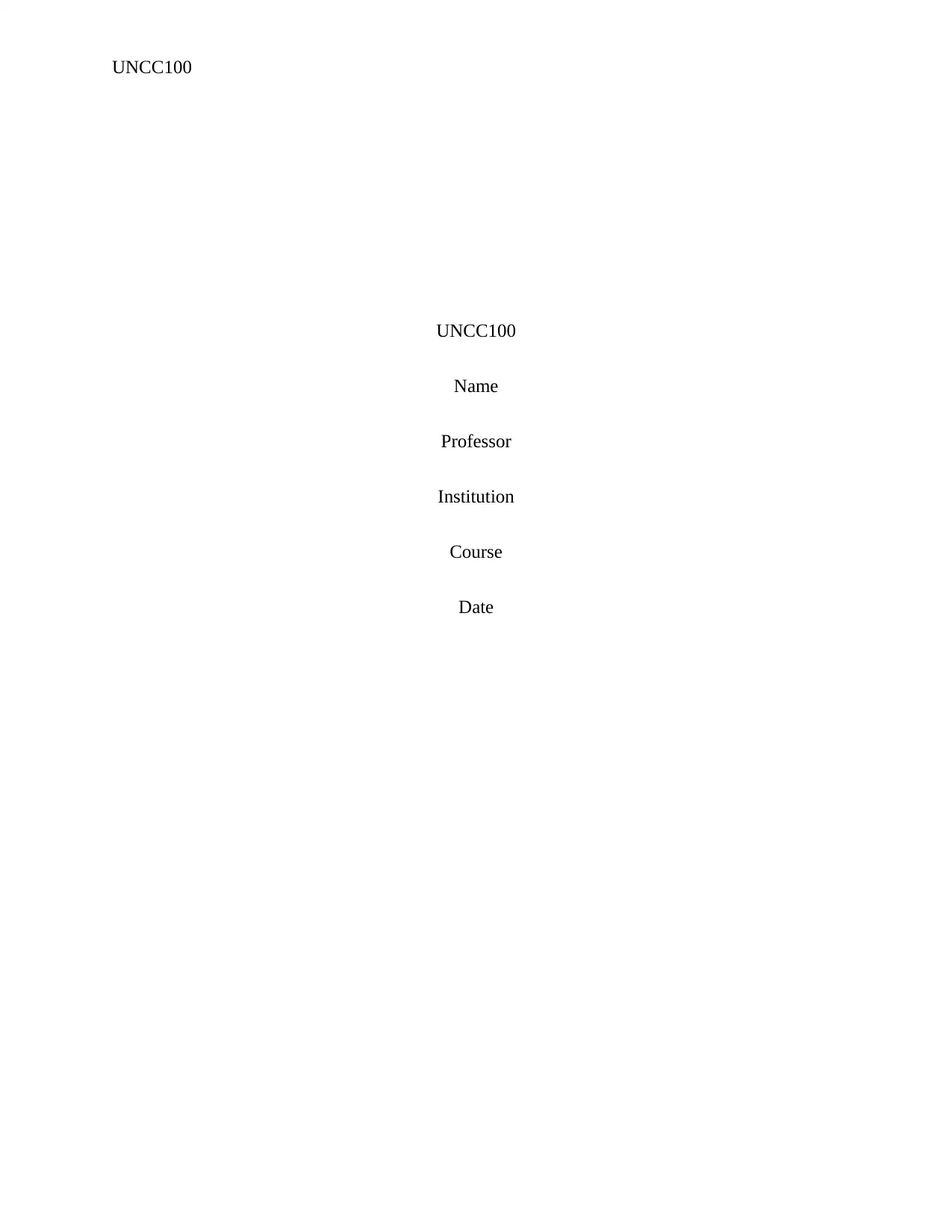
UNCC100
UNCC100
Name
Professor
Institution
Course
Date
UNCC100
Name
Professor
Institution
Course
Date
Paraphrase This Document
Need a fresh take? Get an instant paraphrase of this document with our AI Paraphraser
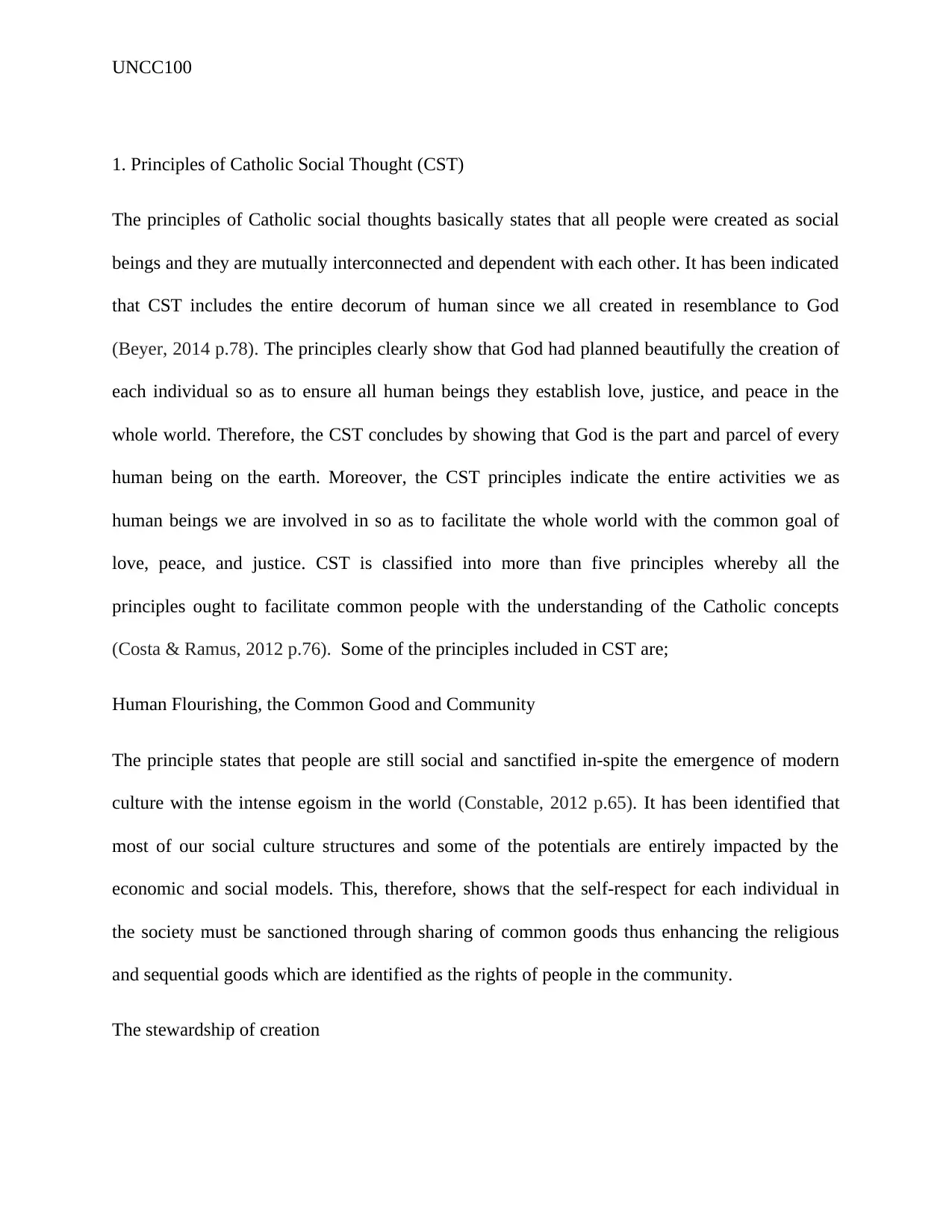
UNCC100
1. Principles of Catholic Social Thought (CST)
The principles of Catholic social thoughts basically states that all people were created as social
beings and they are mutually interconnected and dependent with each other. It has been indicated
that CST includes the entire decorum of human since we all created in resemblance to God
(Beyer, 2014 p.78). The principles clearly show that God had planned beautifully the creation of
each individual so as to ensure all human beings they establish love, justice, and peace in the
whole world. Therefore, the CST concludes by showing that God is the part and parcel of every
human being on the earth. Moreover, the CST principles indicate the entire activities we as
human beings we are involved in so as to facilitate the whole world with the common goal of
love, peace, and justice. CST is classified into more than five principles whereby all the
principles ought to facilitate common people with the understanding of the Catholic concepts
(Costa & Ramus, 2012 p.76). Some of the principles included in CST are;
Human Flourishing, the Common Good and Community
The principle states that people are still social and sanctified in-spite the emergence of modern
culture with the intense egoism in the world (Constable, 2012 p.65). It has been identified that
most of our social culture structures and some of the potentials are entirely impacted by the
economic and social models. This, therefore, shows that the self-respect for each individual in
the society must be sanctioned through sharing of common goods thus enhancing the religious
and sequential goods which are identified as the rights of people in the community.
The stewardship of creation
1. Principles of Catholic Social Thought (CST)
The principles of Catholic social thoughts basically states that all people were created as social
beings and they are mutually interconnected and dependent with each other. It has been indicated
that CST includes the entire decorum of human since we all created in resemblance to God
(Beyer, 2014 p.78). The principles clearly show that God had planned beautifully the creation of
each individual so as to ensure all human beings they establish love, justice, and peace in the
whole world. Therefore, the CST concludes by showing that God is the part and parcel of every
human being on the earth. Moreover, the CST principles indicate the entire activities we as
human beings we are involved in so as to facilitate the whole world with the common goal of
love, peace, and justice. CST is classified into more than five principles whereby all the
principles ought to facilitate common people with the understanding of the Catholic concepts
(Costa & Ramus, 2012 p.76). Some of the principles included in CST are;
Human Flourishing, the Common Good and Community
The principle states that people are still social and sanctified in-spite the emergence of modern
culture with the intense egoism in the world (Constable, 2012 p.65). It has been identified that
most of our social culture structures and some of the potentials are entirely impacted by the
economic and social models. This, therefore, shows that the self-respect for each individual in
the society must be sanctioned through sharing of common goods thus enhancing the religious
and sequential goods which are identified as the rights of people in the community.
The stewardship of creation
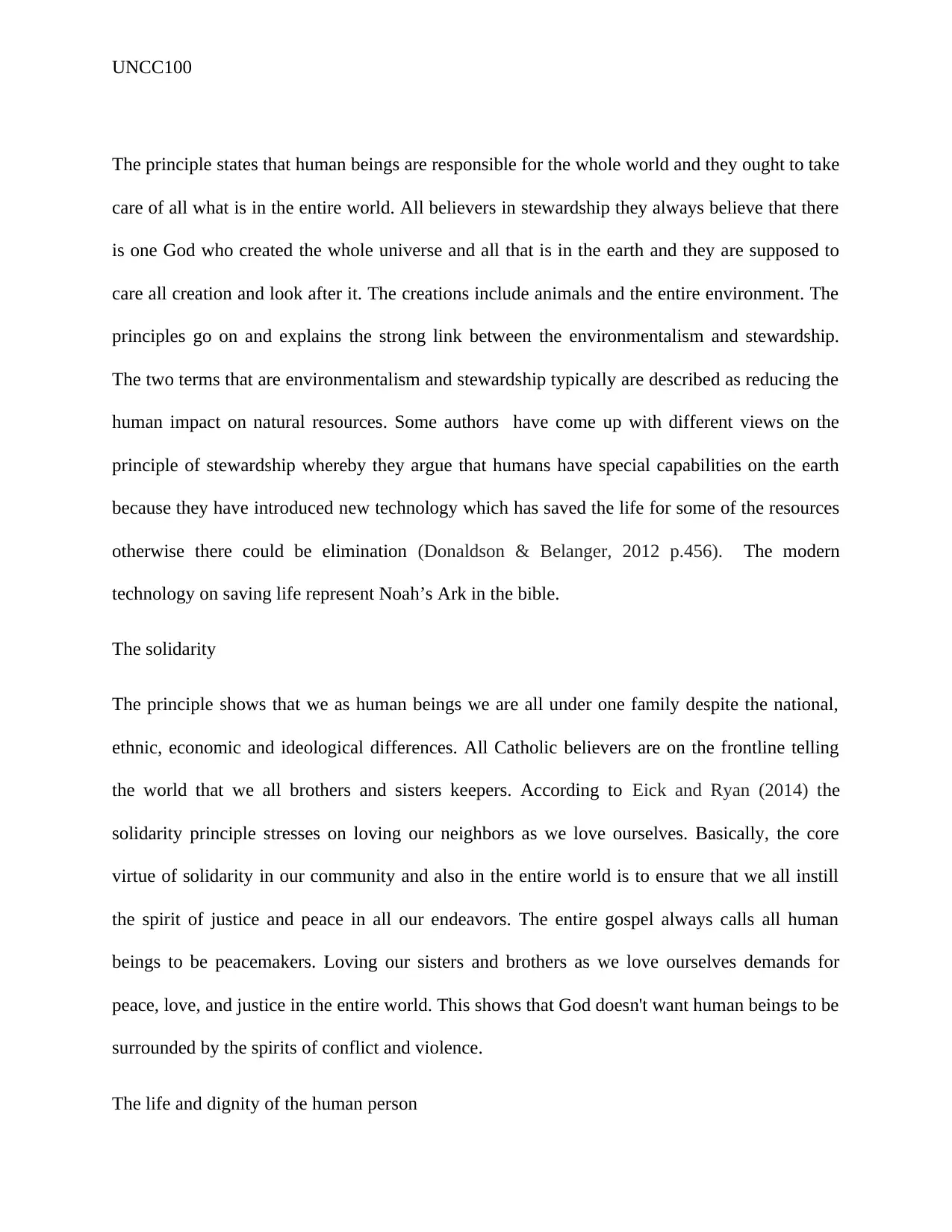
UNCC100
The principle states that human beings are responsible for the whole world and they ought to take
care of all what is in the entire world. All believers in stewardship they always believe that there
is one God who created the whole universe and all that is in the earth and they are supposed to
care all creation and look after it. The creations include animals and the entire environment. The
principles go on and explains the strong link between the environmentalism and stewardship.
The two terms that are environmentalism and stewardship typically are described as reducing the
human impact on natural resources. Some authors have come up with different views on the
principle of stewardship whereby they argue that humans have special capabilities on the earth
because they have introduced new technology which has saved the life for some of the resources
otherwise there could be elimination (Donaldson & Belanger, 2012 p.456). The modern
technology on saving life represent Noah’s Ark in the bible.
The solidarity
The principle shows that we as human beings we are all under one family despite the national,
ethnic, economic and ideological differences. All Catholic believers are on the frontline telling
the world that we all brothers and sisters keepers. According to Eick and Ryan (2014) the
solidarity principle stresses on loving our neighbors as we love ourselves. Basically, the core
virtue of solidarity in our community and also in the entire world is to ensure that we all instill
the spirit of justice and peace in all our endeavors. The entire gospel always calls all human
beings to be peacemakers. Loving our sisters and brothers as we love ourselves demands for
peace, love, and justice in the entire world. This shows that God doesn't want human beings to be
surrounded by the spirits of conflict and violence.
The life and dignity of the human person
The principle states that human beings are responsible for the whole world and they ought to take
care of all what is in the entire world. All believers in stewardship they always believe that there
is one God who created the whole universe and all that is in the earth and they are supposed to
care all creation and look after it. The creations include animals and the entire environment. The
principles go on and explains the strong link between the environmentalism and stewardship.
The two terms that are environmentalism and stewardship typically are described as reducing the
human impact on natural resources. Some authors have come up with different views on the
principle of stewardship whereby they argue that humans have special capabilities on the earth
because they have introduced new technology which has saved the life for some of the resources
otherwise there could be elimination (Donaldson & Belanger, 2012 p.456). The modern
technology on saving life represent Noah’s Ark in the bible.
The solidarity
The principle shows that we as human beings we are all under one family despite the national,
ethnic, economic and ideological differences. All Catholic believers are on the frontline telling
the world that we all brothers and sisters keepers. According to Eick and Ryan (2014) the
solidarity principle stresses on loving our neighbors as we love ourselves. Basically, the core
virtue of solidarity in our community and also in the entire world is to ensure that we all instill
the spirit of justice and peace in all our endeavors. The entire gospel always calls all human
beings to be peacemakers. Loving our sisters and brothers as we love ourselves demands for
peace, love, and justice in the entire world. This shows that God doesn't want human beings to be
surrounded by the spirits of conflict and violence.
The life and dignity of the human person
⊘ This is a preview!⊘
Do you want full access?
Subscribe today to unlock all pages.

Trusted by 1+ million students worldwide
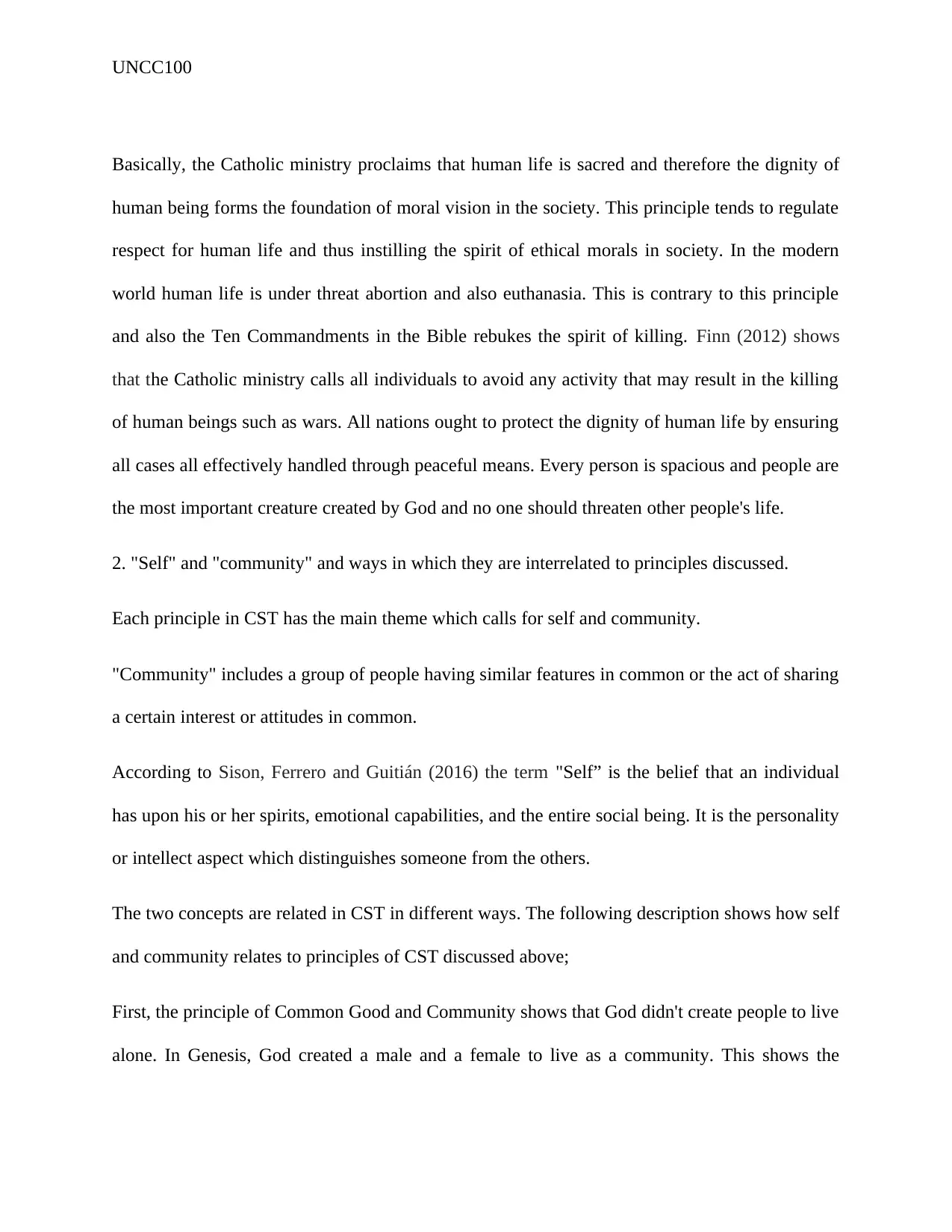
UNCC100
Basically, the Catholic ministry proclaims that human life is sacred and therefore the dignity of
human being forms the foundation of moral vision in the society. This principle tends to regulate
respect for human life and thus instilling the spirit of ethical morals in society. In the modern
world human life is under threat abortion and also euthanasia. This is contrary to this principle
and also the Ten Commandments in the Bible rebukes the spirit of killing. Finn (2012) shows
that the Catholic ministry calls all individuals to avoid any activity that may result in the killing
of human beings such as wars. All nations ought to protect the dignity of human life by ensuring
all cases all effectively handled through peaceful means. Every person is spacious and people are
the most important creature created by God and no one should threaten other people's life.
2. "Self" and "community" and ways in which they are interrelated to principles discussed.
Each principle in CST has the main theme which calls for self and community.
"Community" includes a group of people having similar features in common or the act of sharing
a certain interest or attitudes in common.
According to Sison, Ferrero and Guitián (2016) the term "Self” is the belief that an individual
has upon his or her spirits, emotional capabilities, and the entire social being. It is the personality
or intellect aspect which distinguishes someone from the others.
The two concepts are related in CST in different ways. The following description shows how self
and community relates to principles of CST discussed above;
First, the principle of Common Good and Community shows that God didn't create people to live
alone. In Genesis, God created a male and a female to live as a community. This shows the
Basically, the Catholic ministry proclaims that human life is sacred and therefore the dignity of
human being forms the foundation of moral vision in the society. This principle tends to regulate
respect for human life and thus instilling the spirit of ethical morals in society. In the modern
world human life is under threat abortion and also euthanasia. This is contrary to this principle
and also the Ten Commandments in the Bible rebukes the spirit of killing. Finn (2012) shows
that the Catholic ministry calls all individuals to avoid any activity that may result in the killing
of human beings such as wars. All nations ought to protect the dignity of human life by ensuring
all cases all effectively handled through peaceful means. Every person is spacious and people are
the most important creature created by God and no one should threaten other people's life.
2. "Self" and "community" and ways in which they are interrelated to principles discussed.
Each principle in CST has the main theme which calls for self and community.
"Community" includes a group of people having similar features in common or the act of sharing
a certain interest or attitudes in common.
According to Sison, Ferrero and Guitián (2016) the term "Self” is the belief that an individual
has upon his or her spirits, emotional capabilities, and the entire social being. It is the personality
or intellect aspect which distinguishes someone from the others.
The two concepts are related in CST in different ways. The following description shows how self
and community relates to principles of CST discussed above;
First, the principle of Common Good and Community shows that God didn't create people to live
alone. In Genesis, God created a male and a female to live as a community. This shows the
Paraphrase This Document
Need a fresh take? Get an instant paraphrase of this document with our AI Paraphraser
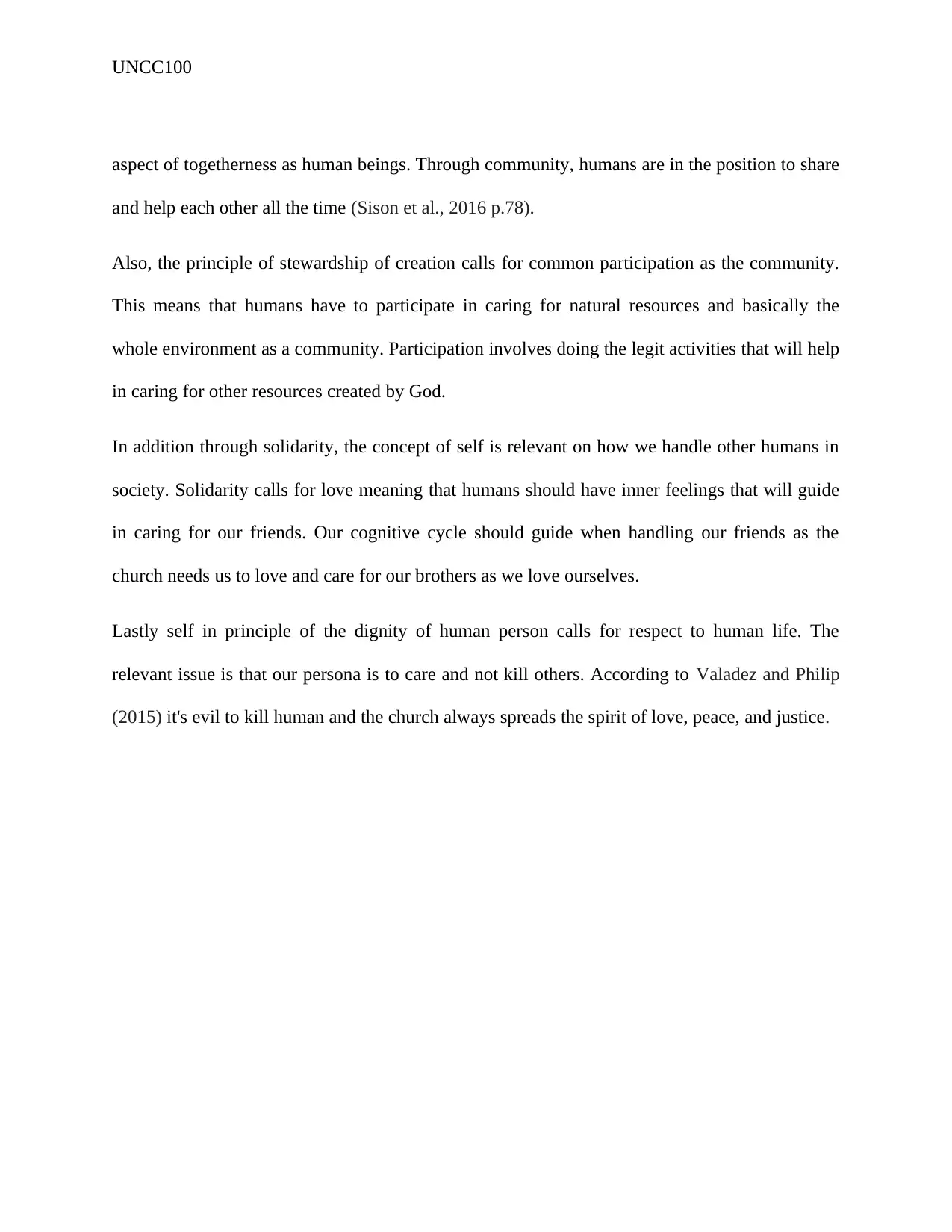
UNCC100
aspect of togetherness as human beings. Through community, humans are in the position to share
and help each other all the time (Sison et al., 2016 p.78).
Also, the principle of stewardship of creation calls for common participation as the community.
This means that humans have to participate in caring for natural resources and basically the
whole environment as a community. Participation involves doing the legit activities that will help
in caring for other resources created by God.
In addition through solidarity, the concept of self is relevant on how we handle other humans in
society. Solidarity calls for love meaning that humans should have inner feelings that will guide
in caring for our friends. Our cognitive cycle should guide when handling our friends as the
church needs us to love and care for our brothers as we love ourselves.
Lastly self in principle of the dignity of human person calls for respect to human life. The
relevant issue is that our persona is to care and not kill others. According to Valadez and Philip
(2015) it's evil to kill human and the church always spreads the spirit of love, peace, and justice.
aspect of togetherness as human beings. Through community, humans are in the position to share
and help each other all the time (Sison et al., 2016 p.78).
Also, the principle of stewardship of creation calls for common participation as the community.
This means that humans have to participate in caring for natural resources and basically the
whole environment as a community. Participation involves doing the legit activities that will help
in caring for other resources created by God.
In addition through solidarity, the concept of self is relevant on how we handle other humans in
society. Solidarity calls for love meaning that humans should have inner feelings that will guide
in caring for our friends. Our cognitive cycle should guide when handling our friends as the
church needs us to love and care for our brothers as we love ourselves.
Lastly self in principle of the dignity of human person calls for respect to human life. The
relevant issue is that our persona is to care and not kill others. According to Valadez and Philip
(2015) it's evil to kill human and the church always spreads the spirit of love, peace, and justice.
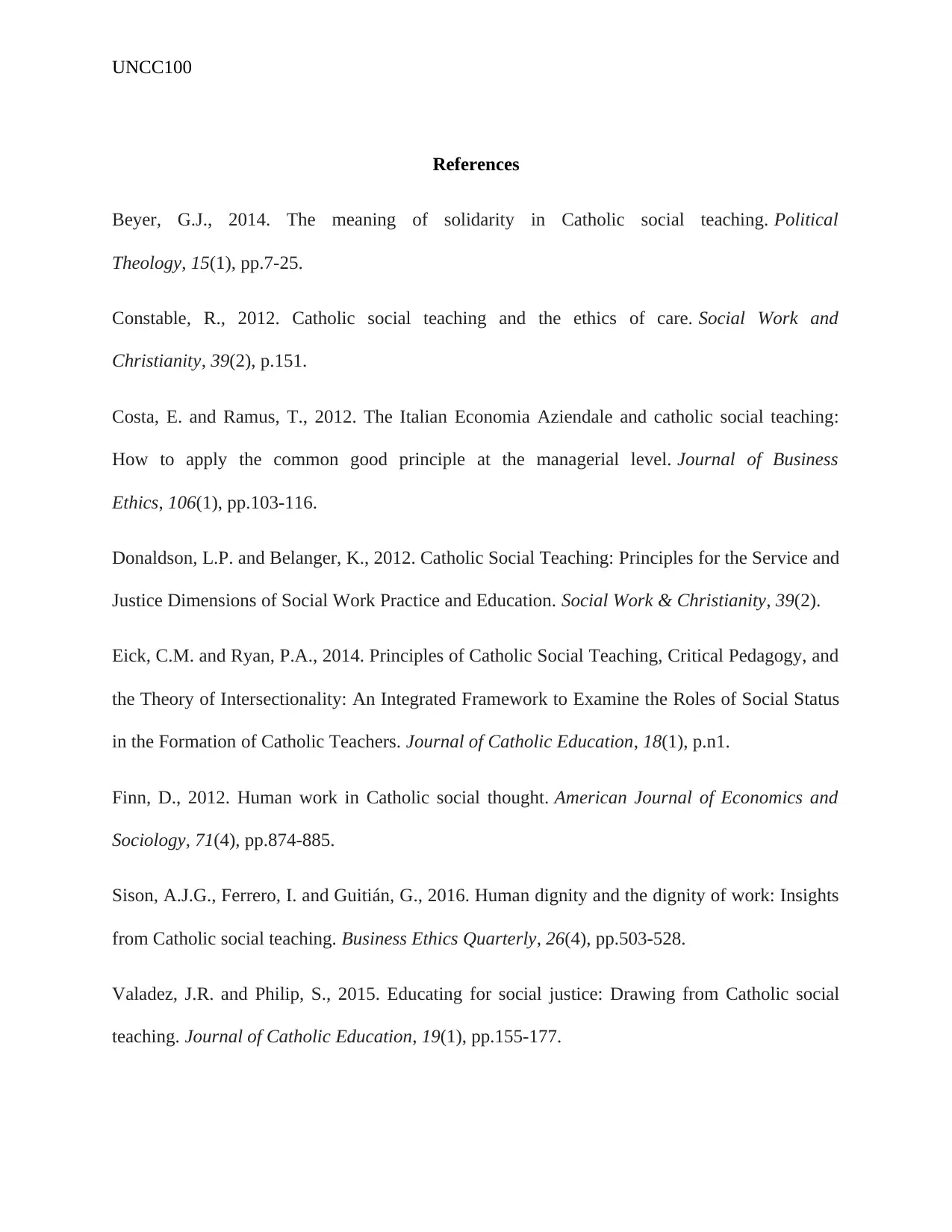
UNCC100
References
Beyer, G.J., 2014. The meaning of solidarity in Catholic social teaching. Political
Theology, 15(1), pp.7-25.
Constable, R., 2012. Catholic social teaching and the ethics of care. Social Work and
Christianity, 39(2), p.151.
Costa, E. and Ramus, T., 2012. The Italian Economia Aziendale and catholic social teaching:
How to apply the common good principle at the managerial level. Journal of Business
Ethics, 106(1), pp.103-116.
Donaldson, L.P. and Belanger, K., 2012. Catholic Social Teaching: Principles for the Service and
Justice Dimensions of Social Work Practice and Education. Social Work & Christianity, 39(2).
Eick, C.M. and Ryan, P.A., 2014. Principles of Catholic Social Teaching, Critical Pedagogy, and
the Theory of Intersectionality: An Integrated Framework to Examine the Roles of Social Status
in the Formation of Catholic Teachers. Journal of Catholic Education, 18(1), p.n1.
Finn, D., 2012. Human work in Catholic social thought. American Journal of Economics and
Sociology, 71(4), pp.874-885.
Sison, A.J.G., Ferrero, I. and Guitián, G., 2016. Human dignity and the dignity of work: Insights
from Catholic social teaching. Business Ethics Quarterly, 26(4), pp.503-528.
Valadez, J.R. and Philip, S., 2015. Educating for social justice: Drawing from Catholic social
teaching. Journal of Catholic Education, 19(1), pp.155-177.
References
Beyer, G.J., 2014. The meaning of solidarity in Catholic social teaching. Political
Theology, 15(1), pp.7-25.
Constable, R., 2012. Catholic social teaching and the ethics of care. Social Work and
Christianity, 39(2), p.151.
Costa, E. and Ramus, T., 2012. The Italian Economia Aziendale and catholic social teaching:
How to apply the common good principle at the managerial level. Journal of Business
Ethics, 106(1), pp.103-116.
Donaldson, L.P. and Belanger, K., 2012. Catholic Social Teaching: Principles for the Service and
Justice Dimensions of Social Work Practice and Education. Social Work & Christianity, 39(2).
Eick, C.M. and Ryan, P.A., 2014. Principles of Catholic Social Teaching, Critical Pedagogy, and
the Theory of Intersectionality: An Integrated Framework to Examine the Roles of Social Status
in the Formation of Catholic Teachers. Journal of Catholic Education, 18(1), p.n1.
Finn, D., 2012. Human work in Catholic social thought. American Journal of Economics and
Sociology, 71(4), pp.874-885.
Sison, A.J.G., Ferrero, I. and Guitián, G., 2016. Human dignity and the dignity of work: Insights
from Catholic social teaching. Business Ethics Quarterly, 26(4), pp.503-528.
Valadez, J.R. and Philip, S., 2015. Educating for social justice: Drawing from Catholic social
teaching. Journal of Catholic Education, 19(1), pp.155-177.
⊘ This is a preview!⊘
Do you want full access?
Subscribe today to unlock all pages.

Trusted by 1+ million students worldwide
1 out of 6
Related Documents
Your All-in-One AI-Powered Toolkit for Academic Success.
+13062052269
info@desklib.com
Available 24*7 on WhatsApp / Email
![[object Object]](/_next/static/media/star-bottom.7253800d.svg)
Unlock your academic potential
Copyright © 2020–2026 A2Z Services. All Rights Reserved. Developed and managed by ZUCOL.




